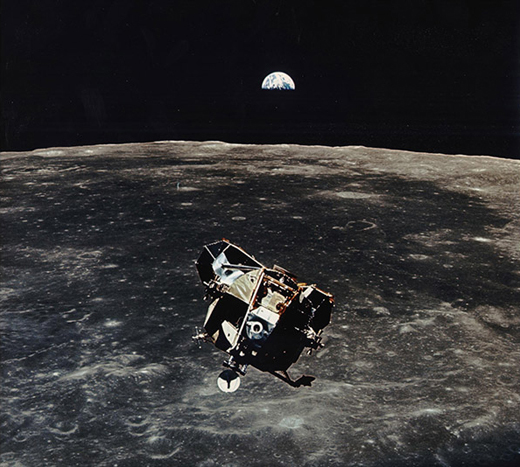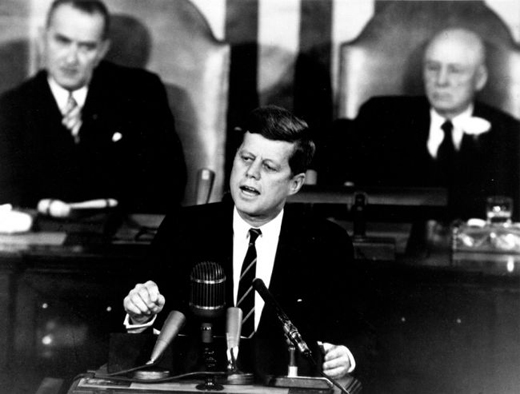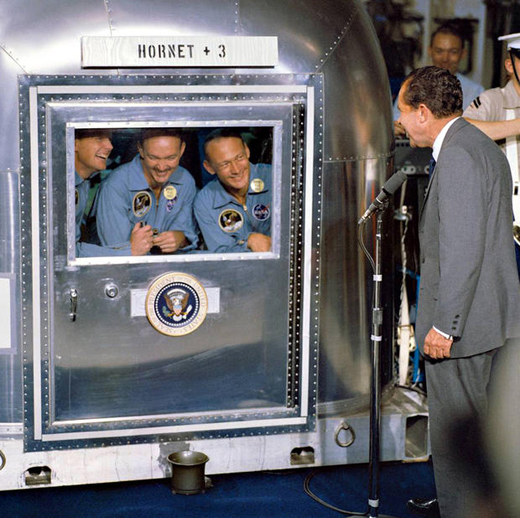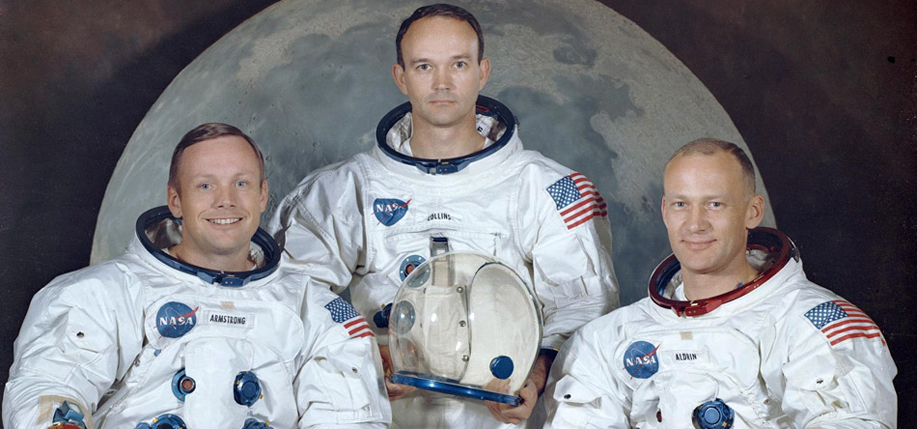The most trusted designated driver of all time reflects on the ride 50 years after lift-off and offers wisdom to those who will be behind the wheel in years to come.
Today (July 20) marks the 50th anniversary of the moon landing, the one where that Armstrong guy took “one small step for man, one giant leap for mankind.” With Neil Armstrong having passed on nearly seven years ago to his next mission above and beyond, and Buzz Aldrin in the spotlight, saluting Congress at the 2019 State of the Union, we at Irish America turn our focus to the third man aboard Apollo 11, fellow Irish American Michael Collins, as the world remembers the spacecraft he successfully returned to Earth on July 24, 1969.
It was at the start of the term at Rice University in Houston, Texas, 1962, that then-President John F. Kennedy declared the United States would touch down on the Moon by the end of the decade. NASA was four years old, Michael Collins and Patricia Mary Finnegan Collins had just celebrated their 5-year anniversary, and America had just celebrated her 186th birthday. The task was daunting, but the curiosity and excitement for space exploration had been bursting in Collins’ blood since he’d read the Buck Rogers comic strips.

The son of a U.S. army officer, Collins was born in Rome and groomed to serve his country. After graduating from West Point in 1952, he joined the air force and while accumulating flying hours at Edwards Air Base in California, he learned that NASA was searching for a new crew of astronauts. Collins started at NASA in 1963; after six years at the job, months of careful planning, and 400 hours in command-module simulation, Command Module Pilot Collins launched an eight-day mission that over half a billion pairs of eyes watched on television screens across the globe.
As the astronaut in charge of orbiting the Moon as his crew mates, Armstrong and Aldrin, collected samples and photographs, Collins spent nearly 24 hours alone in space – at times going hours without radio connection. The most crucial part of the mission was ensuring Aldrin and Armstrong connected back to the main spacecraft. When describing the steps that had to be taken in order to correctly execute the reunion of two vehicles in space, Collins writes in his book, “Against all instinct, one must apply thrust away from the direction of the target, drop down into a lower, faster orbit, and then transfer back up into the original orbit as precisely the right point in the catchup trajectory…” After successfully picking up the lunar explorers, complete with 48 pounds of moon rock and soil samples, the trio was on its way back to the familiar blue oceans, brown land, and white clouds of Mother Earth.
Upon successfully landing in the Pacific Ocean at 16:44 (4:44pm) local time, the crew was led into a quarantine that lasted 18 days. After that, the three most famous men in the world at the time embarked on an international tour that hit 28 cities in 25 countries over the course of just 38 days. While on tour, Collins realized the feat of Apollo 11 was much larger than the trio, NASA, and even the U.S., “I was amazed that everywhere we went, people would say, ‘we.’ ‘We did it.’ We, you and me – the inhabitants of this wonderful Earth – we did it.”
Interviewed July 14 on CBS Sunday Morning by Jeffrey Kluger, Collins said, “I hark back almost daily to John F. Kennedy. I felt that we were fulfilling, if successful, his mandate. And I was just thrilled to be a piece of the whole thing.”

Kluger asked Collins, “Do you at all regret not having closed that final 60 miles, and left Collins boot prints on the Moon?”
“No,” he replied. “I’d a liar or a fool if I said I had the best seat on Apollo 11. But I felt that I was an important part of it. When I was behind the Moon I later discovered I was being described as, oh, lonely, lonely, lonely. I was happy back there. I had my own little domain. And actually, going down and touching the Moon, eh, that was not high on my list.”

Astronaut Eileen Collins, the first woman to command a space shuttle, talked about Collins’ feat in an email to Irish America, “Michael Collins had an extremely difficult job. He knew he would not have the opportunity to actually walk on the Moon, yet he supported the mission from lunar orbit. He was very focused on maintaining that the Apollo service module was in great shape, while orbiting the Moon, so it was ready to take the crew back home. He also had to be ready to react in an emergency. This took a very humble person. Also, obviously his intelligence and discipline made the mission a great success. I recommend people read his book, Carrying The Fire, written in 1974. It is one of the best books written on the Apollo moon program! I read it while I was an Air Force pilot, and found it very inspirational!”
In 2019 the book was re-released with an updated preface in which Collins reflects on the world he finds himself in now. His wife of 57 years, Patricia Mary Finnegan Collins, whose father was born in County Mayo, passed away just over five years ago; as previously mentioned, Neil Armstrong – the first man to step on the Moon – has passed away, and Collins himself is gearing up to celebrate 89 years of life ~ on Earth and beyond.
Now a resident of Florida, Collins reflects on his twenty-plus years of retirement as “fun and fulfilling in many ways. Watching my family grow, all doing well, has been paramount, but beyond that come fishing, reading, chasing the stock market, and exercise, exercise, exercise.” As it just so happens, Collins still talks about space exploration with excitement and curiosity – expressing immense interest in future plans to explore Mars. He speaks of the investment from the private sector with enthusiasm, citing Elon Musk and Jeff Bezos as men who can make anything cheaper and faster may also be the people who can make reaching Mars a reality.
However, when reading Collins’ words, one can easily gather that his views on education are closest to his heart. He is an adamant supporter of well-rounded intelligence and continues to visit universities – MIT being his go-to. When it comes to STEM (Science, Technology, Engineering and Mathematics), Collins believes that while imperative, it is not a complete education alone. He suggests adding English as a pillar to make the acronym STEEM, stressing that if proper knowledge on how to effectively deliver a message is never learned, it won’t matter what the equations express.
When asked the question on everyone’s mind – “How was the Moon?” – Collins reflects, “My primary recollection is not that of the Moon. It is of the Earth as seen from 230,000 miles out…it’s a fragile place and we need to do a better job of taking care of it.” The words were ripe beyond the year in which they were initially uttered and are reminiscent of a statement from JFK’s speech, mentioned earlier: “We meet in an hour of change and challenge, in a decade of hate and fear, in an age of both knowledge and ignorance. The greater our knowledge increases, the greater our ignorance unfolds.”
The countdown to the next world-breaking exploration may be closer than we think, but let us not forget the contributions from the past that have sketched the trajectory for the future – and may we learn from it. Irish America congratulates the achievements of Michael Collins, Buzz Aldrin, Neil Armstrong, NASA and humankind on the 50th anniversary of Apollo 11’s blast-off. ♦
Interested in learning more about what it took to get to the moon and the people that contributed? Read Tom Deignan’s review of American Moonshot by Douglas Brinkley.


Leave a Reply